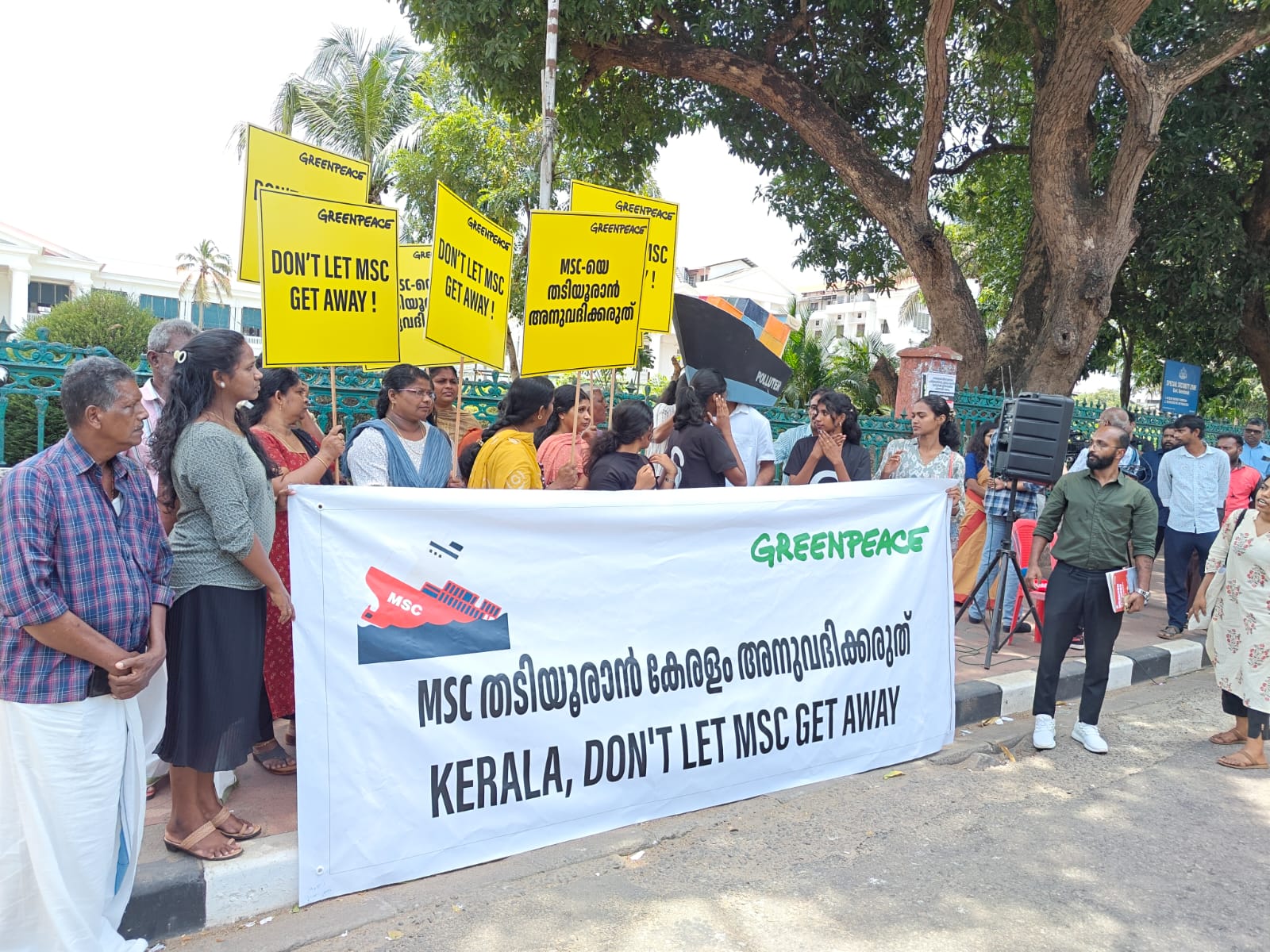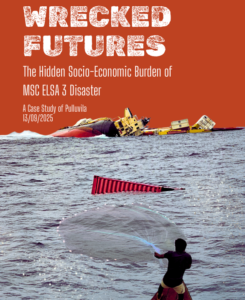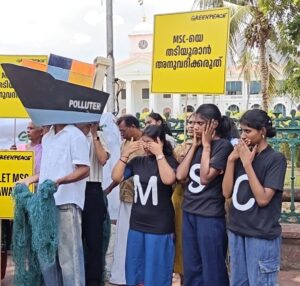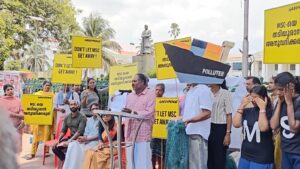For the coastal families, the demand is urgent: swift compensation, debt relief, and accountability from those responsible.
Published Sep 17, 2025 | 11:00 AM ⚊ Updated Sep 17, 2025 | 11:18 AM

Fisherfolk community and Greenpeace India volunteers during the release of the report in front of the Secretariat on 16 September (Supplied)
Synopsis: A new report by Greenpeace India and local fishing associations, released on Tuesday, 16 September, estimates that the average household here has been losing ₹25,000–₹35,000 every month since the disaster — a crippling blow for a community where more than 80 percent of families had no savings to cushion the shock.
Nearly four months after the container vessel MSC ELSA 3 sank off the Kerala coast, the state is still awaiting official clarity on its fallout.
But for the fisherfolk of Pulluvila, a bustling village in Thiruvananthapuram, the impact is already devastating.
A new report by Greenpeace India and local fishing associations, released on Tuesday, 16 September, estimates that the average household here has been losing ₹25,000–₹35,000 every month since the disaster — a crippling blow for a community where more than 80 percent of families had no savings to cushion the shock.
The findings surface at a time when compensation claims are under intense scrutiny, with the Kerala government demanding ₹19,531 crore in damages even as the ship’s owners seek to limit their liability to a fraction of that amount, that is, only ₹132 crore.
The field study by Greenpeace India, in collaboration with the Coastal Students Cultural Forum (CSCF) and Karumkulam panchayat ward member Rethin Antony, has revealed the severe toll it has taken on the fishing community of Pulluvila village in Thiruvananthapuram district.

The report
The Liberia-flagged ship, carrying 643 containers including hazardous cargo such as calcium carbide, hydrazine, diesel, and furnace oil, developed a severe tilt on 24 May 2025, about 30 nautical miles southwest of Kochi Port. A day later it sank.
Its impact on marine ecosystems and livelihoods continues to unfold, particularly in Pulluvila — a densely populated fishing village with limited alternative employment options.
The survey, conducted in June with 286 households — around 6 percent of Pulluvila’s dwellings — found that:

A Greenpeace India volunteer with the damaged fishing net
The incident has disrupted fishing in multiple ways, highlighted the report.
The spillage of plastic nurdles from containers has damaged traditional fishing grounds, forcing crews to venture further into the sea.
Maintaining a trawler costs between ₹7,000 and ₹10,000 per trip, pushing owners into unrecoverable losses on low-yield days.
Floating nurdles are also interfering with boat engines and nets, with each net costing around ₹25,000 and often needing replacement two to three times a year.
Damage of this kind leaves families struggling for over a year to recover, given the average monthly household income of only around ₹12,000.
The study also says that consumer fear of contamination has added to the blow.
Despite no official confirmation of toxic contamination, buyers are hesitant to purchase fish from Pulluvila and nearby coasts.
Women vendors reported being unable to sell their daily catch in Thiruvananthapuram city, further shrinking household incomes.
According to the study, 71 percent of families have already shifted their fishing zones since the incident, abandoning traditional fishing grounds littered with container debris and nurdles.
Many said the sudden disruption left them with little time to adapt, compounding existing climate-related stresses and restrictions caused by Vizhinjam port operations.
The report categorises losses into three dimensions:
Pulluvila, spanning 12 of Karumkulam panchayat’s 18 wards, was chosen as a representative case because of its heavy reliance on fishing and proximity to affected waters. Researchers argue that insights from this study extend beyond one village, offering lessons for coastal resilience across Kerala.
“The MSC Elsa 3 incident underscores how maritime accidents intersect with existing vulnerabilities — from climate change to large-scale development projects — leaving already marginalised communities more exposed,” the study notes.
With losses mounting, Pulluvila’s fishing families are now demanding government intervention for compensation, debt relief, and long-term measures to safeguard livelihoods from such compounded hazards.
The report stated that families in Pulluvila are grappling with mounting financial distress as damages from plastic and container debris continue to erode their livelihoods.
Many are being pushed into new loans to cover basic needs, including school and college fees for their children.
“I submitted a letter to the Fisheries Department, detailing losses of nearly ₹70,000 due to damage to my nets and engine caused by plastic and container debris. Now, I can’t afford to operate my boat and have been forced to work on another boat for lower wages,” said Denson, a 43-year-old fish worker from Pulluvila village during the release of the report in front of the Secretariat on 16 September.

Denson during the report release function organized in front of the Secretariat on 16 September
The situation reflects a broader crisis extending beyond a single village, campaigners warn.
“This is a glimpse into the stark realities of coastal communities across the affected region. At its core, this is about corporate negligence and the lack of accountability from MSC. They should not be allowed to exploit loopholes in legal and policy systems to minimize compensation. Any settlement that fails to address real losses will amount to a grave injustice for Kerala’s coastal families,” said Amruta S.N., climate campaigner at Greenpeace India.
At the same time, Chief Minister Pinarayi Vijayan on Tuesday informed the Assembly that the state government has initiated a comprehensive assessment of the environmental impact of the recent shipwreck off Kerala’s coast and has also approached the High Court seeking compensation.
The Chief Minister said that the Special Secretary of the Environment Department has been designated as the Principal Impact Assessment Officer to oversee the assessment, rehabilitation, and remedial measures.
As part of the process, the Terms of Reference for the environmental impact study were prepared and submitted to the National Institute of Oceanography (NIO) on 17 June, 2025. Following this, a proposal from NIO was reviewed by a 20-member expert committee constituted by the Kerala State Pollution Control Board (KSPCB).
The Pollution Control Board has now entered into an agreement with CSIR-NIO to carry out a long-term study on the extent of the damage. However, Vijayan noted that the preliminary report of the study is yet to be made available.
In addition, NIO has been tasked with assessing the environmental damage, including potential losses faced by the fishing sector.
The government has also filed an Admiralty Suit (Admi S.No. 12/2025) before the High Court to address matters related to compensation.
As the state awaits scientific clarity on the long-term environmental fallout of the MSC Elsa 3 wreck, Pulluvila’s fisherfolk are already living its harshest realities — plunging incomes, rising debts, and mounting uncertainty.
For the coastal families, the demand is urgent: swift compensation, debt relief, and accountability from those responsible.
(Edited by Sumavarsha)
